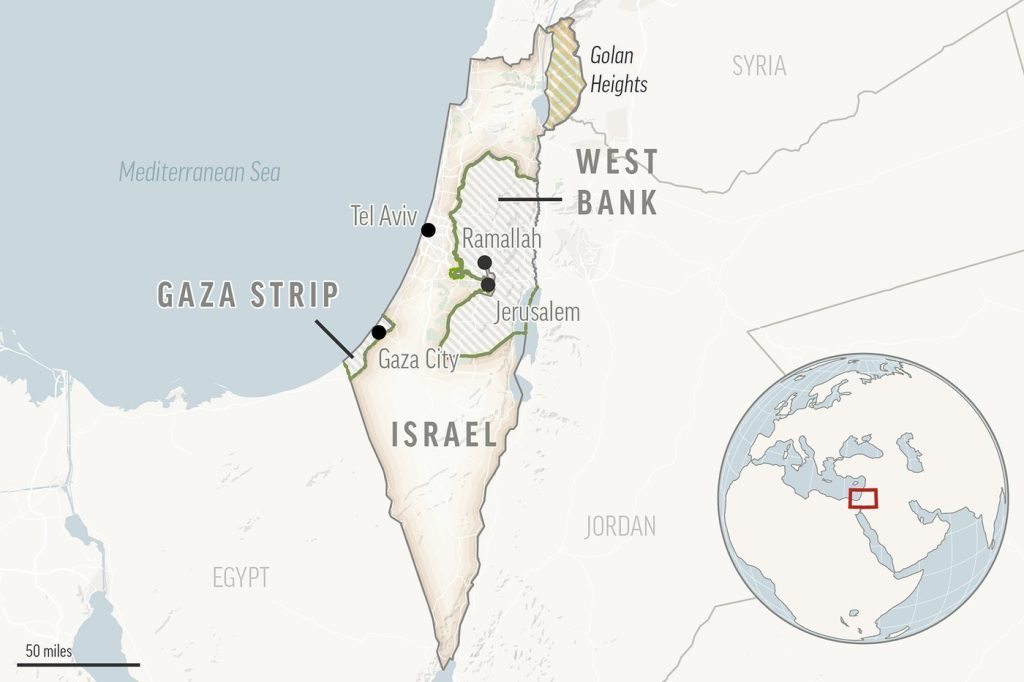DEIR AL-BALAH, Gaza Strip (AP) – Israeli airstrikes on the Gaza Strip overnight into Thursday resulted in the deaths of at least 23 individuals, including a family of ten, as reported by local health officials. This latest escalation occurs amidst a pressing humanitarian crisis, exacerbated by a six-week-old blockade that has effectively cut off all food and essential supplies from entering the territory, drawing alarm from the United Nations.
Following the resumption of hostilities after a ceasefire with Hamas ended last month, Israel has intensified its bombardment, reportedly killing hundreds and seizing significant portions of the territory to apply pressure on militants for a revised agreement. Strikes in the southern city of Khan Younis claimed the lives of five children, four women, and a man, all severely burnt according to Nasser Hospital. In northern Gaza, further strikes resulted in the death of 13 people, including nine children, as confirmed by the Indonesian Hospital.
The Israeli military maintains that it endeavors to minimize civilian casualties and attributes the deaths of non-combatants to Hamas, claiming that the group operates within residential areas. However, there was no immediate response from Israeli officials regarding the most recent strikes.
The U.N. humanitarian office, OCHA, stated that the overwhelming majority of Gaza's more than 2 million residents now depend on daily food supplies from charity kitchens, which prepare 1 million meals a day with support from aid groups. Many food distribution programs have ceased operations due to depleted supplies, prompting the U.N. and other organizations to redirect their remaining stocks toward these charity kitchens.
Accessing food in markets has become increasingly difficult, as skyrocketing prices render them unaffordable for most residents, leaving humanitarian aid as the main food source for about 80% of the population, according to the World Food Program's April report on Gaza's market conditions. OCHA has warned that the Gaza Strip is likely experiencing the worst humanitarian crisis since the onset of hostilities in October 2023.
Shaina Low, a spokesperson for the Norwegian Refugee Council, emphasized that most individuals in Gaza are resorting to one meal per day, a stark contrast to the nutritional needs of the population. Water scarcity is another critical issue, as many Palestinians stand in long lines to collect water from trucks. Omar Shatat, a representative from a local water utility, reported that residents now depend on six to seven liters per day, significantly below the U.N.'s estimated requirements for basic needs.
Israeli Defense Minister Israel Katz has indicated that restricting humanitarian aid is a key strategy against Hamas, which Israel accuses of diverting aid for its governance. Israel is demanding that Hamas release more hostages as a prerequisite for any new ceasefire and is insisting on disarmament and a complete withdrawal from Gaza, pledging to maintain control over significant "security zones" within the territory.
Hamas currently holds 59 hostages, with 24 believed to be alive. The organization states it will only release them in exchange for the liberation of more Palestinian prisoners and a comprehensive Israeli withdrawal from Gaza, alongside a lasting truce in line with the now-defunct ceasefire agreement from earlier this year.
Hani Almadhoun, co-founder of Gaza Soup Kitchen, revealed that his facility has enough food for only about three more weeks, consisting mainly of pasta and rice without fresh produce, chicken, or beef. He noted that 15-20% of individuals coming to his kitchen leave empty-handed.
The ongoing conflict began when Hamas-led militants launched an attack on southern Israel on October 7, 2023, resulting in approximately 1,200 casualties, predominantly among civilians, and the abduction of 251 individuals. Since then, many hostages have been released through ceasefire agreements, and Israel has managed to rescue eight while recovering numerous bodies.
According to the Gaza Health Ministry, Israel's offensive has led to over 51,000 Palestinian casualties, primarily women and children, but it does not specify how many were civilians versus combatants. Israel, for its part, asserts that it has eliminated around 20,000 militants, although it has yet to provide supporting evidence for this claim.
The ongoing warfare has devastated vast areas of Gaza, obliterating much of its food production capacities and forcing around 90% of the population to flee their homes. Hundreds of thousands are currently living in makeshift tent camps and destroyed buildings.










